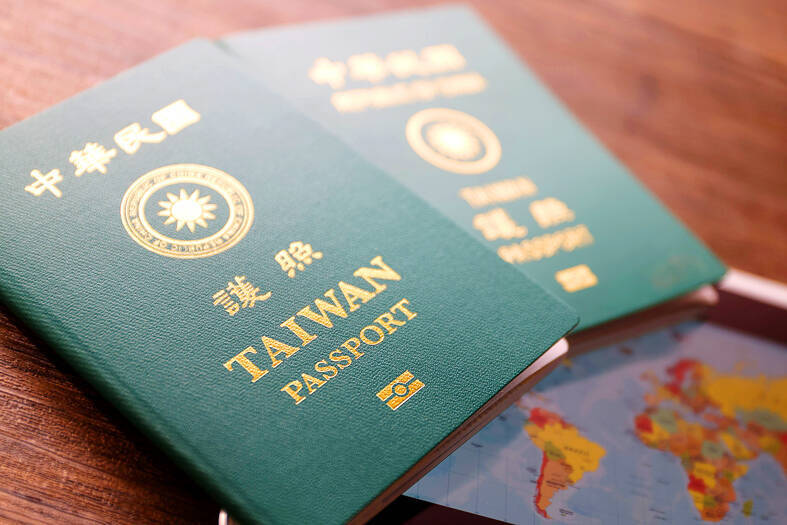Judicial authorities are investigating the alleged sale of Republic of China passports to China-based gangs.
The Taoyuan District Prosecutors’ Office last week indicted 13 people, including alleged operation heads Huang Shih-hsien (黃世賢) and Chiu Cheng-wen (邱政文), for alleged passport fraud.
In 2018, border control officials at international airports in Rome and Madrid alerted Taipei that they had stopped Chinese nationals who were using altered Taiwanese passports to enter the nations.

Photo: CNA
Taoyuan prosecutors coordinated with police and the National Immigration Agency’s (NIA) Border Affairs Corps in an investigation, leading the indictment of Huang, 48, and Chiu, 46, and the seizure of Taiwanese passports and other travel documents — including Chinese-issued “Taiwan Compatriot Permits” — for about a dozen people.
Eleven others were indicted for allegedly selling passports, contravening the Passport Act (護照條例), as well as breaches of the Criminal Code for allegedly causing a public official to make false records in public documents, and use of forged or altered documents.
Huang and Chiu made a lot of money through alleged illegal sales of Taiwanese passports to Chinese groups by seeking out impoverished people and paying them to apply for travel documents, the indictment said.
The case has damaged the credibility and international trust of the Taiwan passport, and compromised border controls and national security, it said.
From 2015 to 2019, Huang and Chiu would visit Taipei Railway Station and public parks, including Wanhua District’s (萬華) Bangka Park (艋舺公園), seeking out impoverished or homeless people, prosecutors said.
The pair would pay people up to NT$25,000 to apply for a passport, with help from travel agency staff who also assisted with applying for documents to travel to China, prosecutors said.
The people they recruited were also given cash to buy clothes and given tickets to fly to China, prosecutors said.
While in China, the recruits were taken to apply for bank accounts, they said, adding that they handed over their passports upon their return to Taiwan.
Huang and Chiu then sold the travel documents to Chinese groups for up to NT$300,000, prosecutors said, adding that the passports could be resold for up to US$50,000.
NIA officials said that the illegal passport trade is lucrative in China and there is high demand for Taiwanese passports, due to the nation’s reciprocal visa-free agreements with more than 100 countries.
Taiwanese passports are highly sought after by Chinese officials and businesspeople who are facing charges for economic crimes, or others facing prosecution and seeking to escape abroad, as well as wealthy families to move their assets outside China or seeking entry into the US, Canada or European countries, the NIA officials said.
Moreover, Chinese intelligence officials carry Taiwanese passports as cover, authorities said.
Additional reporting by Huang Ching-hsuan

DEFENSE: The National Security Bureau promised to expand communication and intelligence cooperation with global partners and enhance its strategic analytical skills China has not only increased military exercises and “gray zone” tactics against Taiwan this year, but also continues to recruit military personnel for espionage, the National Security Bureau (NSB) said yesterday in a report to the Legislative Yuan. The bureau submitted the report ahead of NSB Director-General Tsai Ming-yen’s (蔡明彥) appearance before the Foreign and National Defense Committee today. Last year, the Chinese People’s Liberation Army (PLA) conducted “Joint Sword-2024A and B” military exercises targeting Taiwan and carried out 40 combat readiness patrols, the bureau said. In addition, Chinese military aircraft entered Taiwan’s airspace 3,070 times last year, up about

Taiwan is stepping up plans to create self-sufficient supply chains for combat drones and increase foreign orders from the US to counter China’s numerical superiority, a defense official said on Saturday. Commenting on condition of anonymity, the official said the nation’s armed forces are in agreement with US Admiral Samuel Paparo’s assessment that Taiwan’s military must be prepared to turn the nation’s waters into a “hellscape” for the Chinese People’s Liberation Army (PLA). Paparo, the commander of the US Indo-Pacific Command, reiterated the concept during a Congressional hearing in Washington on Wednesday. He first coined the term in a security conference last

A magnitude 4.3 earthquake struck eastern Taiwan's Hualien County at 8:31am today, according to the Central Weather Administration (CWA). The epicenter of the temblor was located in Hualien County, about 70.3 kilometers south southwest of Hualien County Hall, at a depth of 23.2km, according to the administration. There were no immediate reports of damage resulting from the quake. The earthquake's intensity, which gauges the actual effect of a temblor, was highest in Taitung County, where it measured 3 on Taiwan's 7-tier intensity scale. The quake also measured an intensity of 2 in Hualien and Nantou counties, the CWA said.

The Overseas Community Affairs Council (OCAC) yesterday announced a fundraising campaign to support survivors of the magnitude 7.7 earthquake that struck Myanmar on March 28, with two prayer events scheduled in Taipei and Taichung later this week. “While initial rescue operations have concluded [in Myanmar], many survivors are now facing increasingly difficult living conditions,” OCAC Minister Hsu Chia-ching (徐佳青) told a news conference in Taipei. The fundraising campaign, which runs through May 31, is focused on supporting the reconstruction of damaged overseas compatriot schools, assisting students from Myanmar in Taiwan, and providing essential items, such as drinking water, food and medical supplies,